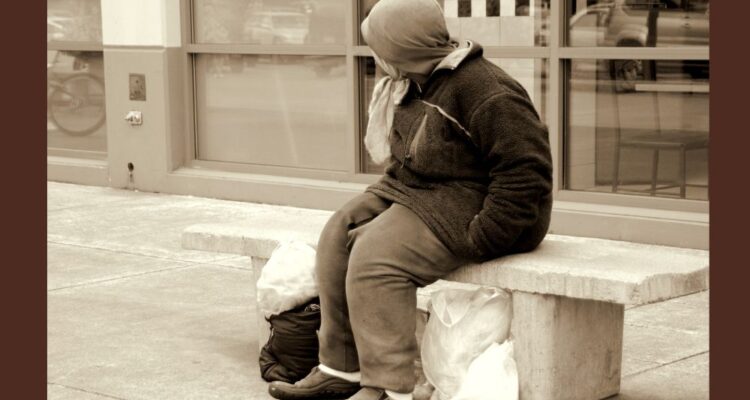It was the end of a balmy San Diego Christmas day. My family had just left, and as my kids were winding down from all the excitement, I tackled the clutter: finding places to put away the new toys, storing used gift bags for next year, creating shelf space in the pantry for stocking goodies.
My husband had his feet up, resting from all the cooking he had done for us, but I—like many women, I imagine— couldn’t seem to relax when I was surrounded by such a mess. Grabbing an armful of discarded toy boxes, I left my house and headed around the corner to the dumpster. We live in a gated condo community, and I worried the recycling dumpster would already be filled to overflowing.
As I walked down the sidewalk, I heard a man singing. I didn’t recognize the tune, but the man had talent and it seemed a lovely song. I looked around my tower of empty boxes and spotted someone sitting on a bench just beyond the gate: a homeless man with a shopping cart full of his belongings.
This is a common sight in San Diego; we are a city surrounded by palm trees and tent encampments. There are over 1,500 unhoused people living downtown alone, with many more in residential neighborhoods. It’s not unusual to see half a dozen folks sleeping on sidewalks in the mile it takes me to drive to Target.
That Christmas day, I had in my hands the remnants of my own personal privilege: a mountain of discarded boxes from toys we were adding to our already-full toy area. This was the thought I was chewing on when the man interrupted his song to say “Merry Christmas” to me. In my own discomfort, I hurried past him, and turned the corner toward the dumpster before I whispered “Merry Christmas” back to him—a useless reply he never heard.
When I laid in bed that night, thinking about the events of the day, the looks of glee on my children’s faces, the happy chatter of my parents in the kitchen, the table we gathered around to feast on cheese fondue, it was the memory of the unhoused man that kept replaying in my mind.
Why couldn’t I have simply returned his greeting? Was it my rush, my discomfort, my shame? The man could have been Jesus himself, and I didn’t slow my stride long enough to find out.
In his book Grace Can Lead Us Home, Kevin Nye writes:
“…unhoused people are ready for, and in need of, connection and friendship. They are our neighbors; the very same that Jesus calls us to love in the same way we love God and ourselves (…) If we went against our impulses and made eye contact, perhaps even smiled or nodded at one another, acknowledging our shared existence and humanity, we all might just become a little more human in the process.”
At times, we are confronted by deep inequities, and situations arise that reflect our own advantages in life back to us. I know well the default reactions, the ones that preserve both our comfort and the status quo: to rush on by, to look the other way, to avoid certain parts of town. But the arrival of God in the flesh can’t be good news just for me and for those on the “right” side of a gated community. Jesus must be good news for everyone.
God didn’t avoid us in our neediness, didn’t rush by or look the other way. Jesus moved right in to the midst of it all, and I have a feeling that here in San Diego, he’d be among the makeshift tents downtown, walking alongside overflowing shopping carts, or holding a Styrofoam cup of coffee and waiting in line at the social services building. Love is risky like that, scandalous even.
I don’t need to go as far as downtown for an opportunity to show God’s love to a person experiencing homelessness; such encounters are readily available on the paths I walk daily. What I do need are the heart and eyes of Christ, to see beyond the issue to the actual person, and to respond with love.

